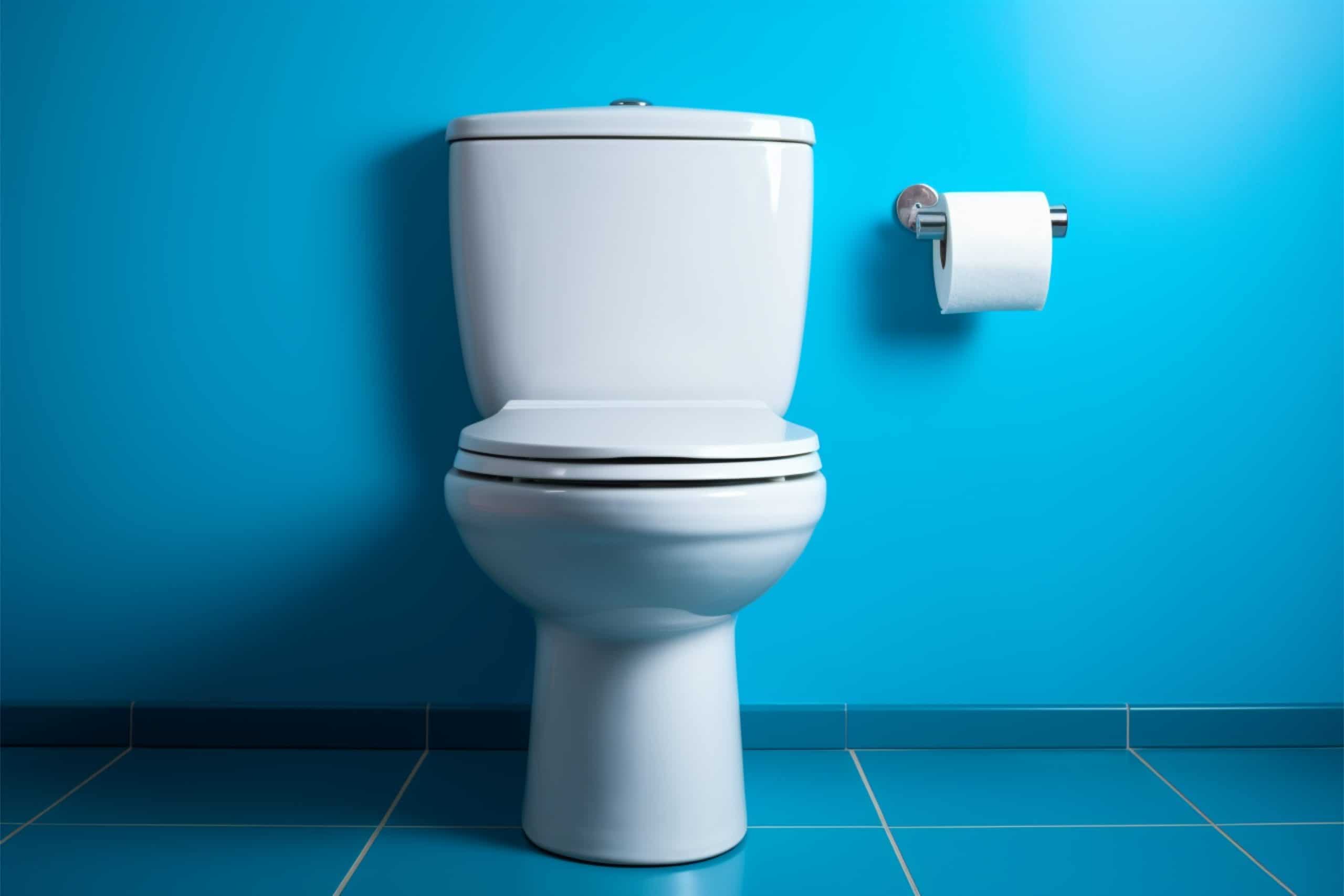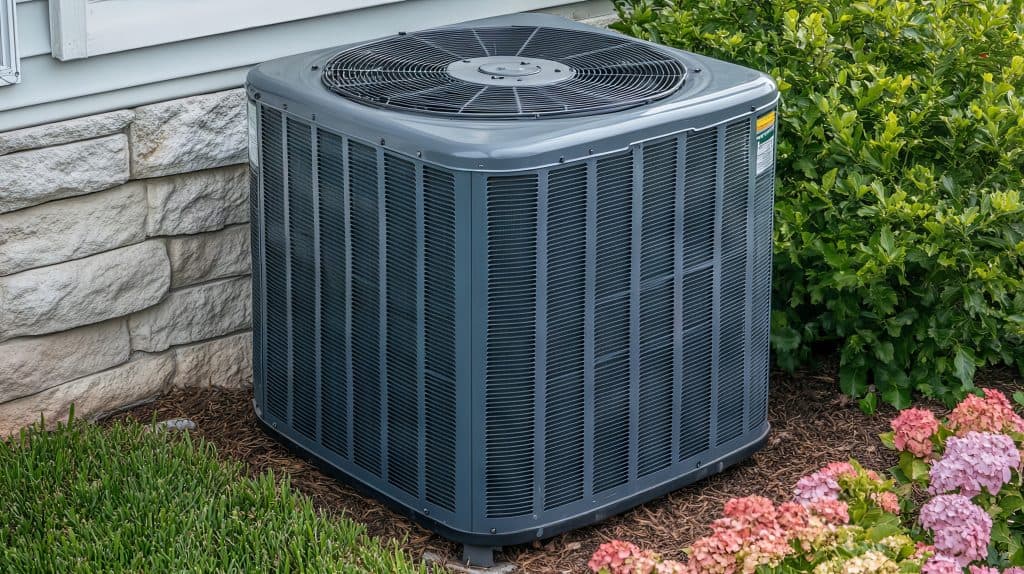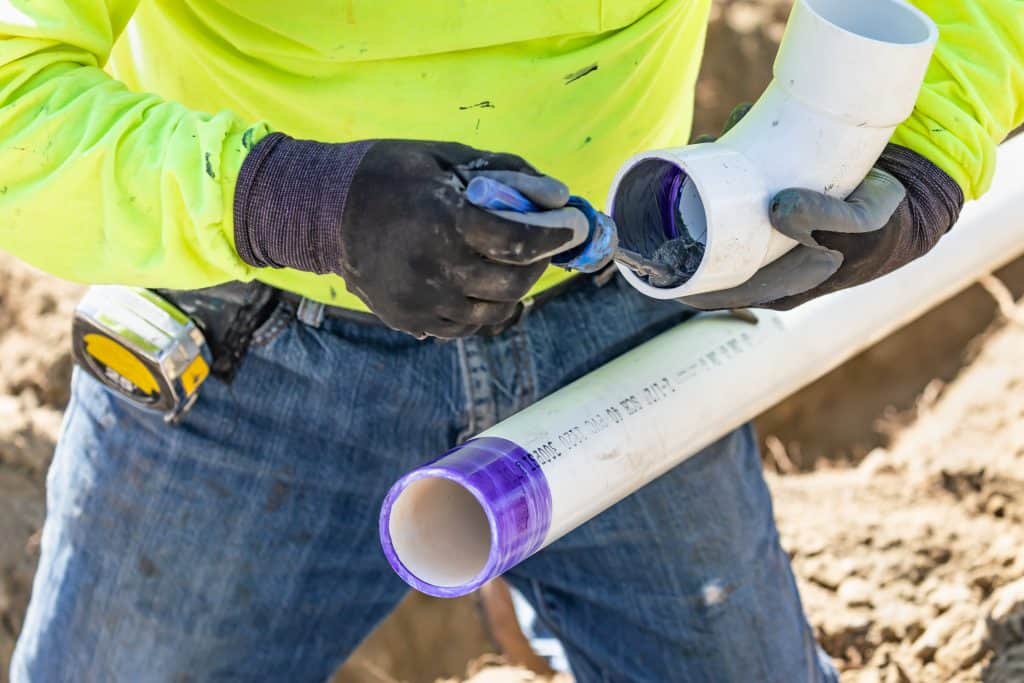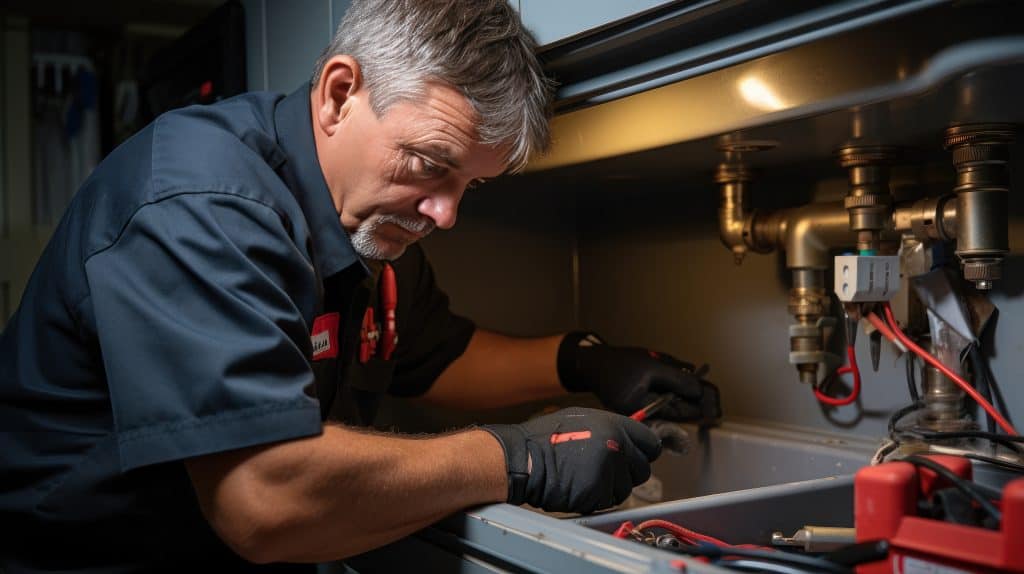Hard water stains in toilets are a common issue for homeowners in Oklahoma – including Converse and Kirby – leaving behind unsightly rings and buildup that can be tough to remove. These stains not only affect the appearance of your toilet but can also contribute to long-term plumbing issues if ignored. Understanding what causes hard water stains in toilets and how to remove and prevent them is key to keeping your bathroom clean and your plumbing system in top condition.
Hard water stains in toilets form when water with high mineral content, primarily calcium and magnesium, evaporates and leaves deposits behind. Over time, these minerals accumulate, creating stubborn discoloration that regular cleaning might not fully remove. While these stains are mostly cosmetic, excessive buildup can contribute to clogged pipes and reduced water flow. Taking the right steps to eliminate hard water stains can help maintain the efficiency of your plumbing system.
In this guide, we’ll cover what causes these stains, how to identify them, and the most effective DIY methods for removing them. We’ll also discuss when professional help may be needed and how to prevent hard water stains in the future. By staying proactive, you can avoid ongoing hard water issues and keep your toilet looking fresh.
What Causes Hard Water Stains in Toilets?
Hard water contains high levels of dissolved minerals, primarily calcium and magnesium. In Converse and Kirby, these minerals are naturally present in the water supply, making hard water stains in toilets a frequent concern for homeowners. When hard water sits in a toilet bowl, it gradually leaves behind a chalky residue that hardens over time, making it increasingly difficult to remove.
Aside from stains, hard water deposits can accumulate inside pipes, reducing water flow and efficiency. Mineral buildup can also affect other household fixtures, leading to issues like clogged faucets, dull-looking sinks, and inefficient water heaters. Addressing these problems early can help prevent bigger plumbing issues down the road. Learning about common plumbing problems can help you take the right preventive steps.
How to Identify Hard Water Stains in Toilets
Hard water stains in toilets are usually easy to spot. They often appear as:
- Brown, orange, or white rings around the waterline
- Chalky or scaly residue along the sides of the bowl
- Streaks or spots that resist basic scrubbing
Because these stains form gradually, regular inspections can help catch buildup before it becomes difficult to remove. Identifying hard water stains early makes the cleaning process much easier and helps maintain your toilet’s appearance.
DIY Solutions for Removing Hard Water Stains
Getting rid of hard water stains in toilets doesn’t have to be complicated. Simple household ingredients like vinegar and baking soda can be highly effective in breaking down mineral deposits. Try this step-by-step method for a natural, non-toxic way to clean your toilet:
- Pour one cup of white vinegar into the toilet bowl and let it sit for at least 10 minutes.
- Sprinkle baking soda around the bowl, focusing on stained areas.
- Use a toilet brush to scrub thoroughly, loosening any mineral buildup.
- Let the mixture sit for another 10 minutes, then flush to rinse away residue.
For stubborn stains, a pumice stone specifically designed for toilet cleaning can help remove mineral buildup without scratching the porcelain. Always keep the stone and the toilet bowl wet while scrubbing to prevent damage.
When DIY methods don’t fully remove the stains or the buildup returns quickly, it may be a sign of a more significant issue. Knowing when to call a professional can help prevent further damage to your plumbing system.
Preventing Hard Water Stains in Toilets
The best way to deal with hard water stains in toilets is to prevent them from forming in the first place. These simple habits can help:
- Clean your toilet regularly with a vinegar solution to break down mineral deposits before they harden.
- Use an automatic toilet bowl cleaner that helps minimize buildup with every flush.
- Flush your toilet frequently to prevent standing water from leaving mineral deposits.
- Consider installing a water softener to reduce the mineral content in your home’s water supply.
By staying consistent with maintenance, you can avoid the hassle of scrubbing stubborn stains and keep your toilet in excellent condition.
Important Facts About Hard Water Stains in ToiletsHard water stains are a common problem for homeowners, especially in Converse and Kirby. These stains not only affect the appearance of toilets but also impact plumbing health. Understanding hard water and how to manage it is essential. Here are some important facts to keep in mind:
|
Professional Solutions for Stubborn Stains
When hard water stains in toilets become too tough for household cleaners, professional solutions offer a more effective approach. Stubborn stains often indicate deeper mineral buildup that DIY methods struggle to remove. Professional plumbers use industrial-grade cleaning agents and advanced tools to eliminate these deposits without damaging your toilet, ensuring long-term results.
Beyond stain removal, experts can assess whether hard water is causing damage to your plumbing system. Mineral buildup can affect water flow, contribute to clogs, and reduce the efficiency of your fixtures. A professional inspection can help identify potential issues before they lead to costly repairs. Knowing when to call a professional can help prevent long-term plumbing problems and keep your system running smoothly.
Professional services also provide tailored recommendations for maintaining a stain-free toilet. From specialty cleaning products to preventive treatments, plumbers can suggest solutions that work best for your home’s water conditions. With expert guidance, homeowners can protect their plumbing while keeping their toilets clean and free from hard water stains.
Preventing Hard Water Stains
Keeping hard water stains in toilets from returning requires a proactive approach. One of the most effective solutions is installing a water softener, which reduces the mineral content in your water supply. With fewer deposits, stains are less likely to form, and your plumbing fixtures stay in better condition over time.
Simple daily habits can also make a big difference. Regularly cleaning your toilet with a mild cleaner prevents mineral buildup before it becomes a problem. Flushing frequently, wiping down the bowl, and avoiding abrasive scrubbing methods help maintain a clean surface without damaging the porcelain. Routine plumbing maintenance further ensures that hard water doesn’t cause hidden damage throughout your system.
Understanding the causes of hard water stains and taking preventive measures saves time and money in the long run. Small efforts can go a long way in keeping your toilet stain-free while extending the life of your plumbing system.
Long-Term Solutions for Hard Water in Kirby
For homeowners in Kirby dealing with persistent hard water issues, long-term solutions provide the best protection. Whole-house water filtration systems offer an effective way to reduce the mineral content in your water, preventing hard water stains in toilets and other fixtures. Addressing the root cause of hard water helps improve plumbing efficiency and reduces the need for constant cleaning.
Local plumbing professionals can assess your home’s water quality and recommend the best filtration system for your needs. Regular maintenance ensures these systems continue performing at their best, providing consistent water quality and protecting your plumbing from buildup. Improving water efficiency through filtration and sustainable plumbing practices can also help lower water bills and reduce waste.
Investing in long-term solutions not only eliminates current hard water problems but also prevents future issues. With the right combination of filtration, maintenance, and expert guidance, homeowners in Kirby can keep their plumbing system running efficiently while maintaining a cleaner, stain-free toilet.
FAQs: Hard Water Stains in Toilet
This section answers common questions about hard water stains in toilets. Understanding these can help keep your toilet clean and your plumbing healthy.
What are the primary causes of hard water stains in toilets?
Hard water stains occur due to minerals like calcium and magnesium in water. These minerals leave deposits on toilet surfaces.
How often should I clean my toilet to prevent hard water stains?
Clean your toilet at least once a week. Regular cleaning helps prevent minerals from building up over time.
Are there any eco-friendly products for treating hard water stains?
Yes, products like vinegar and baking soda offer eco-friendly ways to remove stains. These household items are both safe and effective.
Can hard water stains damage my toilet permanently?
Over time, hard water stains can cause damage. They can eat away at the toilet’s surface if not managed properly.
How do I know if I need professional help for hard water issues?
If you cannot remove stains with regular cleaning, or if stains keep coming back, it might be time to call a professional. They provide solutions for persistent problems.
Achieving a Stain-Free Toilet
Hard water stains in toilets affect many homes in Converse and Kirby. These stains are more than a cosmetic issue. They can lead to long-term problems if left unaddressed. The minerals in hard water leave behind unsightly stains and can also impact the health of your plumbing system. Toilets, being a critical part of every household, must remain clean and efficient. Treating and preventing these stains is crucial.
Understanding hard water and its effects helps you tackle the issue. Hard water contains high levels of minerals, primarily calcium and magnesium. These minerals are responsible for the white, chalky stains that appear in toilets and other fixtures. Regular cleaning with household items like vinegar and baking soda can often keep these stains at bay. For tougher stains, seeking professional help ensures the longevity of your plumbing system.
Prevention is always better than cure. Homeowners can use water softeners to reduce the mineral content in their water supply. Routine maintenance also plays a key role in keeping hard water stains away. Regular inspections and prompt repairs prevent minor issues from turning into costly repairs. In Kirby, where hard water is a common problem, employing long-term solutions specific to this area can be beneficial. Efficient plumbing practices and expert recommendations contribute to sustainable living.
Dealing with hard water stains effectively combines understanding, action, and prevention. By maintaining a clean toilet, you ensure not only a pleasant aesthetic but also a healthier plumbing system. Proper management of hard water stains can save you from future headaches and expenses. Homeowners should take proactive steps to keep their toilets stain-free and functioning optimally.
Keep Your Toilet Spotless
Managing hard water stains is vital for a clean and efficient toilet system. Whether you choose DIY solutions or professional services, taking action keeps your plumbing in top shape. A stain-free toilet is not just about looks; it’s about maintaining a functioning and healthy home environment. Ensure regular cleaning and preventive measures to enjoy a stain-free toilet.
If you’re struggling with hard water stains, consider reaching out for expert help. Call Bracken Plumbing for expert recommendations near you. Our team can provide tailored solutions that protect your home from the adverse effects of hard water. Don’t wait for the problem to worsen. Act today to preserve the beauty and function of your toilet.




